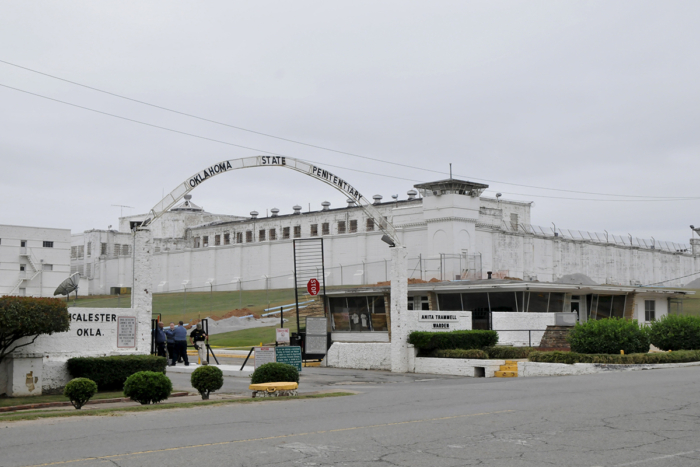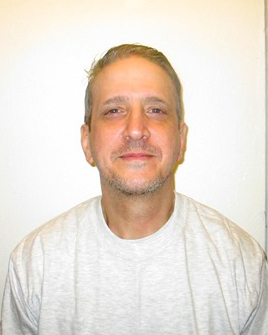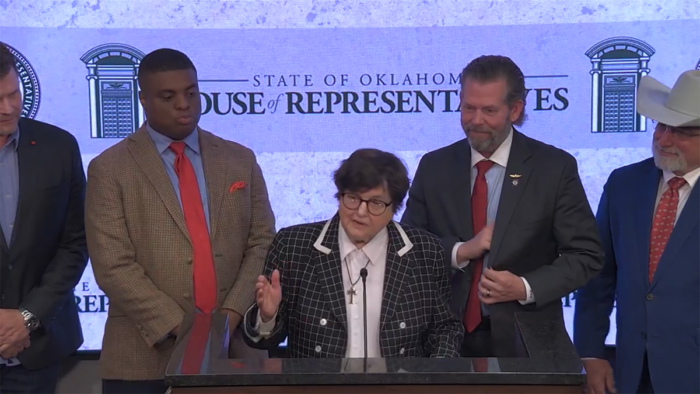Oklahoma faith leaders join lawmakers in urging postponement of execution over concernsPosted May 4, 2023 |
|

Richard Glossip is scheduled to be executed May 18 at the Oklahoma State Penitentiary in McAlester. Photo: Reuters
[Episcopal News Service] A coalition of Christian leaders in Oklahoma, including Episcopalians, rallied at the state Capitol in Oklahoma City on May 4 behind an effort to halt the looming execution of a 60-year-old man convicted of plotting to kill his boss in 1997.
Richard Glossip is scheduled to be put to death on May 18 amid intensifying calls for a postponement, including from Republican state lawmakers and state Attorney General Gentner Drummond, also a Republican. Retired Oklahoma Bishop Ed Konieczny, who has served on the Oklahoma Pardon and Parole Board since January 2022, was one of two board members who supported granting Glossip clemency last month, though the death row inmate’s bid for clemency failed in a split vote of the board.

Richard Glossip, seen in a 2021 Oklahoma Department of Corrections photo, was convicting of hiring an accomplice to kill his boss in 1997.
The lawmakers and faith leaders who spoke at the May 4 news conference are calling on Gov. Kevin Stitt to issue a 60-day stay of execution and urging the Legislature to enact laws that would grant Glossip and others on death row expanded options for relief in court. Stitt cannot grant clemency without a recommendation from the parole board.
“We are tough on crime. But tough on crime means smart on crime, and a rush to an execution when there are still pending lawsuits does not seem to be safe or strategic at all,” Rep. Kevin McDugle said.
“We are people of faith,” said the Rev. John-Mark Hart, a Baptist pastor. “As people of faith, we feel a responsibility to say we need to have a morally grounded dialog about this.”
Hart was one of 26 Christian leaders who drafted and signed a statement in November 2022 opposing the state’s scheduling of 25 executions over two years. The Rt. Rev. Poulson Reed, current bishop of the Episcopal Diocese of Oklahoma, also was among the initial signers of the statement, as was the Rev. Nathan Carr, vicar of St. John’s Episcopal Church in Oklahoma City.
“As Christians and Oklahomans, we have grave concerns about this action. Given the current reality of our state’s criminal justice system, our shared convictions regarding the sanctity of human life and the proper function of state power lead us to call for an immediate moratorium on the death penalty in Oklahoma,” the statement reads.
Carr, who attended the rally and news conference at the Capitol, spoke with Episcopal News Service earlier in the morning. He invoked Episcopalians’ Baptismal Covenant as the basis for the church’s advocacy against the death penalty: “We respect the dignity of every human being.”
“Even criminals must be given opportunities for restorative justice,” Carr told ENS. “That may include a life without parole situation, so that society is safe but that also gives time for amendment of life, as the old prayer book adage would say. It gives an opportunity for God to be at work in life.”

Sister Helen Prejean, author of “Dead Man Walking,” speaks May 4 alongside Oklahoma faith leaders and lawmakers in a livestreamed news conference at the Capitol in support of a stay of execution for Richard Glossip.
Oklahoma has 42 inmates on death row, according to the Death Penalty Info Center, and Glossip would be the fourth man executed by the state in the past year if his sentenced is carried out. Glossip was accused of hiring a 19-year-old man to kill Barry Van Treese at the Best Budget Inn, the motel he owned, in Oklahoma City. The alleged accomplice who carried out the murder, Justin Sneed, was sentenced to life in prison without parole, while Glossip was sentenced to death, partly based on Sneed’s testimony.
Glossip has insisted he was innocent, saying Sneed killed Van Treese during a robbery attempt. Supporters of clemency for Glossip say they don’t think he received a fair trial.
“I’m not a murderer, and I don’t deserve to die for this,” Glossip said at his April 26 parole board hearing, according to The Oklahoman.
The Episcopal Church first expressed formal opposition to execution at the 1958 General Convention and has called on Episcopalians to urge their state governments to stop the practice. General Convention reaffirmed its opposition in 1979, 1991, 2000, 2015 and 2018, when it called for all death row prisoners to have their sentences reduced.
– David Paulsen is a senior reporter and editor for Episcopal News Service. He can be reached at dpaulsen@episcopalchurch.org.

Social Menu